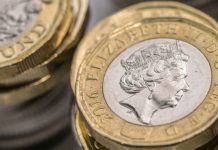On Monday, the pound finished lower where it started with the euro exchange rate. The pound initially rallied on news that a deal had been agreed upon with Northern Ireland’s Democratic Unionist Party (DUP) which would keep UK Prime Minister Theresa May in power. However, later, upon relieving news that a full-scale Italian banking crisis was avoided, the euro bounced back, bringing the exchange rate back to €1.1375. The day’s high was €1.1390 – remaining noticeably below the €1.1400 level.
| What do these figures mean? |
|---|
|
When measuring the value of a pair of currencies, one set equals 1 unit and the other shows the current equivalent. As the market moves, the amount will vary from minute to minute. For example, it could be written: 1 GBP = 1.13990 EUR Here, £1 is equivalent to approximately €1.14. This specifically measures the pound’s worth against the euro. If the euro amount increases in this pairing, it’s positive for the pound. Or, if you were looking at it the other way around: 1 EUR = 0.87271 GBP In this example, €1 is equivalent to approximately £0.87. This measures the euro’s worth versus the British pound. If the sterling number gets larger, it’s good news for the euro. |
However, despite mixed news, the pound continues to trade at its highest level in a week against the euro, as the political haze is starting clear in the UK. After two weeks of wrangling, the Conservatives and DUP have agreed to a “confidence and supply” deal which means that the 10 DUP MP’s will support the Conservatives in key Parliamentary votes. In turn, the DUP’s extra votes will ensure the Conservatives secure a majority and, in return, the DUP will receive £1 billion extra funding for Northern Ireland.
Demand for the pound increased following the news, because the deal increased Britain’s political stability. However as the day wore on and reports were uncovered of a possible backlash from Scotland and Wales, the pound started to fall again.
| How does political stability boost a currency? |
|---|
| Political stability boosts both consumer and business confidence, which means corporations and regular households alike are more likely to spend money. The increased spending, in turn, then boosts the economy. Foreign investors prefer to invest their money in politically stable countries as well as those with strong economies. For foreign investors to put their money into an economy, they need local currency. As they acquire the money needed, the demand for that particular currency increases, which then boosts its value. |
The euro was also experiencing solid demand on Monday with investors deciding to focus on the positives of Italy’s intervention in winding down two banks, rather than the negatives. The European Central Bank (ECB) accepted the Italian government’s move to bail out two of its mid-sized banks in deals that potentially cost up to €17 billion. Italy’s strongest lender, Intesa Sanpaolo, has said it is open to taking on the good assets of Veneto Banca and Banca Populare di Vicenza, whilst the toxic debt from those two banks will sit on government books.
The euro initially lost ground on the news after the weekend amid concerns that the fragile Italian banking sector could destabilise the eurozone financial sector. Italy is already in the process of bailing out another of its banks, Monte dei Paschi di Siena, for €6.6 billion. However, investors quickly focused on the fact that these bailouts actually remove a major headache for European regulators and should actually strengthen the sector.
Finally, comments by ECB President Draghi on Monday afternoon pulled the euro marginally lower, boosting the pound in the euro exchange rate. Draghi once again defended the ECB’s loose monetary policy, dashing hopes of an interest rate rise anytime soon. As interest rate hopes decrease so usually does the value of the currency.
| Why do raised interest rates boost a currency’s value? |
|---|
| Interest rates are key to understanding exchange rate movements. Those who have large sums of money to invest want the highest return on their investments. Higher interest rate environments tend to offer higher yields. So, if the interest rate or at least the interest rate expectation of a country is relatively higher compared to another, then it attracts more foreign capital investment. Large corporations and investors need local currency to invest. More local currency used then boosts the demand of that currency, pushing the value higher. |
|
This article was initially published on TransferWise.com from the same author. The content at Currency Live is the sole opinion of the authors and in no way reflects the views of TransferWise Inc. |





